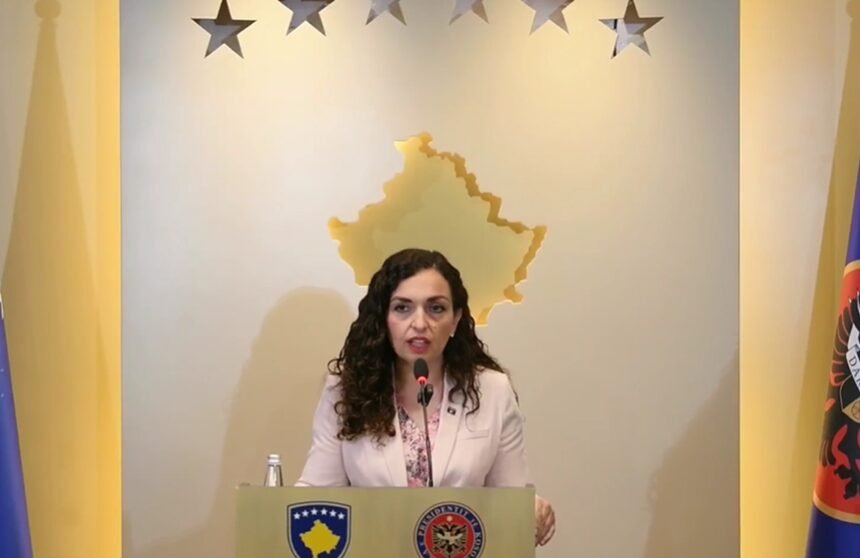Civil society organizations have called on President Vjosa Osmani to convene parliamentary parties to find a temporary solution for the 2026 budget and the Growth Plan agreement before the Assembly is dissolved and the country heads to elections.
Highlighting the consequences of failing to approve them, the letter addressed to Osmani also suggests pursuing legal avenues to enable such measures.
Four Proposals from the Letter by 21 NGOs:
- The acting government should submit the 2026 budget draft law to the Assembly, in accordance with the powers granted by the Law on Government, as well as with the Constitution, other laws, and rulings of the Constitutional Court, so that the current Assembly can adopt a regular budget for the coming year through an accelerated procedure. This is considered the best and safest option, given that forming new institutions could be delayed for months, as happened earlier this year. The new government, once constituted, could further amend and adjust the budget according to its program. If this option is not possible, the current Assembly should at least vote to extend the existing budget until the end of March 2026, based on Article 24 of the Law on Public Financial Management, to ensure basic state functions and financial stability until new institutions are formed.
- Such a step would prevent an unprecedented budget crisis and bring greater stability and security for citizens, especially those dependent on public salaries and transfers, shielding them from economic anxiety during the election period. Financial and institutional stability is also crucial for the democratic process, allowing citizens to exercise their voting rights freely and without economic or future uncertainty.
- The Facilitation Agreement, already negotiated and signed by the European Commission and the Kosovo government, should be ratified. Additionally, the Hua Agreement should be signed by the acting Deputy Minister at the Ministry of Finance, since there is no parliamentary mandate. The signing does not violate the Law on Government, as the initiative occurred on December 4, 2024, when the government had full mandate. Only after ratifying these agreements can Kosovo benefit from the Growth Plan.
- To accelerate procedures, it is recommended to apply Article 123 of the Assembly Rules, which allows bypassing deadlines and other procedural steps so that the budget approval and agreement ratification can be done with the urgency required by the situation.
In the letter, President Osmani’s role is described as a “unifying figure determined to prevent a crisis that would affect many families in Kosovo and to strengthen confidence in institutions and the EU partnership at this decisive moment for the country.”
Civil Society Organizations Signing the Letter:
GAP Institute, Kosovo Foundation for Civil Society (KCSF), Institute for Development Policy (INDEP), Kosovo Institute for European Policy (EPIK), Group for Legal and Political Studies (GLPS), Kosovo Local Government Institute (KLGI), SHL-Kosova, Balkan Green Foundation (BGF), Community Building Mitrovica (CBM), Community Development Fund (CDF), Kosovo Center for Gender Studies (QKSGJ), Activism Roots, Forum for Civic Initiatives (FIQ), Center for Social Group Development (CSGD), Kosova – Women 4 Women (K-W4W), EC Ma Ndryshe, YMCA Kosova, TOKA, Organization for Partnership, Engagement and Development (OPED), Advocacy Training and Resource Center (ATRC), Prishtina Institute for Political Studies (PIPS).
Last Sunday, the Assembly voted against forming the Kurti 3 government. Now it is up to the president to initiate consultations for a second mandate or to send the country to elections. The failure to form a new government has raised concerns over state functioning for next year. Not approving the 2026 budget, according to MPs and experts, could suspend public payments and capital investments.
Kosovo and Bosnia and Herzegovina remain the only countries in the region unable to benefit from the EU Growth Plan. Kosovo was among the first countries for which the Commission approved such an agenda in autumn last year, but payments cannot proceed as Kosovo currently lacks functioning institutions to formally conclude agreements with the EU, which require a two-thirds parliamentary ratification.
As a result, due to the ongoing institutional crisis, Kosovo is unable to access hundreds of millions in Growth Plan funding, even though the technical and formal conditions were met months ago.







